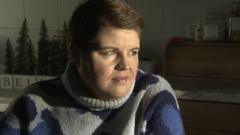Voters in the Republic of Ireland are facing acute frustrations as they head towards the general election this Friday, with many feeling that they are not benefiting from the country’s economic success. One resident, Emma, reflects the sentiment of many as she voices her concern regarding medical wait times for her children, claiming, “I hear we are one of the richest countries in the world and we have never been richer, but I don't see it.”
Challenges in healthcare have been a consistent theme, particularly in counties far removed from Dublin, such as County Donegal, which residents describe as feeling “forgotten.” While the Irish government boasts a substantial budget surplus aided in part by previous tax windfalls, citizens express skepticism about tangible improvements in their daily lives. The local journalist, Áine Ní Bhreisleáin, underscores the rising cost of living and struggles with housing, with some residents feeling that they are not experiencing the benefits of the nation’s wealth.
Housing remains a critical issue as current reports suggest that 58,000 individuals are waiting for social housing, while an urgent need for 35,000 new homes annually is highlighted. Meanwhile, immigration adds another layer of complexity, especially as Donegal receives a notable number of asylum seekers. Locals such as Greg Hughes, a radio host, point out that some residents feel that immigrants are being prioritized in social services, intensifying feelings of frustration and disconnection.
Voter Margarite further emphasizes the perceived inequality, stating, “I think there's a gap between the wealth in the country and the people on the ground,” indicating a stark contrast between Ireland’s economic claims and the lived realities in rural areas.
Political parties, including the outgoing coalition of Fine Gael, Fianna Fáil, and the Green Party, aim to retain their power amid criticism, while Sinn Féin seeks to emerge as the leading party post-election. With voter discontent palpable, the focus now shifts to how the election outcomes will address the pressing issues raised by concerned citizens throughout the campaign.
Challenges in healthcare have been a consistent theme, particularly in counties far removed from Dublin, such as County Donegal, which residents describe as feeling “forgotten.” While the Irish government boasts a substantial budget surplus aided in part by previous tax windfalls, citizens express skepticism about tangible improvements in their daily lives. The local journalist, Áine Ní Bhreisleáin, underscores the rising cost of living and struggles with housing, with some residents feeling that they are not experiencing the benefits of the nation’s wealth.
Housing remains a critical issue as current reports suggest that 58,000 individuals are waiting for social housing, while an urgent need for 35,000 new homes annually is highlighted. Meanwhile, immigration adds another layer of complexity, especially as Donegal receives a notable number of asylum seekers. Locals such as Greg Hughes, a radio host, point out that some residents feel that immigrants are being prioritized in social services, intensifying feelings of frustration and disconnection.
Voter Margarite further emphasizes the perceived inequality, stating, “I think there's a gap between the wealth in the country and the people on the ground,” indicating a stark contrast between Ireland’s economic claims and the lived realities in rural areas.
Political parties, including the outgoing coalition of Fine Gael, Fianna Fáil, and the Green Party, aim to retain their power amid criticism, while Sinn Féin seeks to emerge as the leading party post-election. With voter discontent palpable, the focus now shifts to how the election outcomes will address the pressing issues raised by concerned citizens throughout the campaign.



















